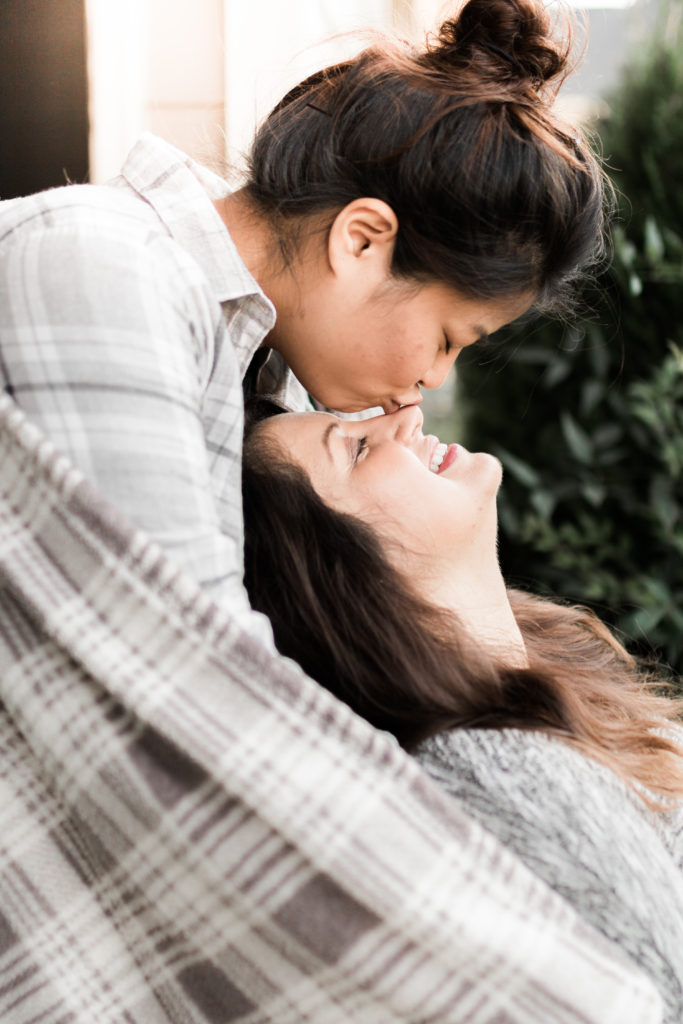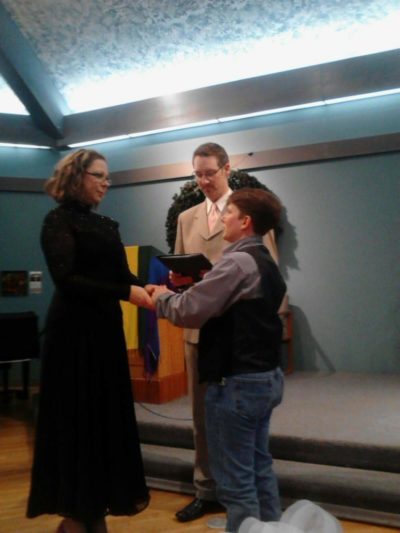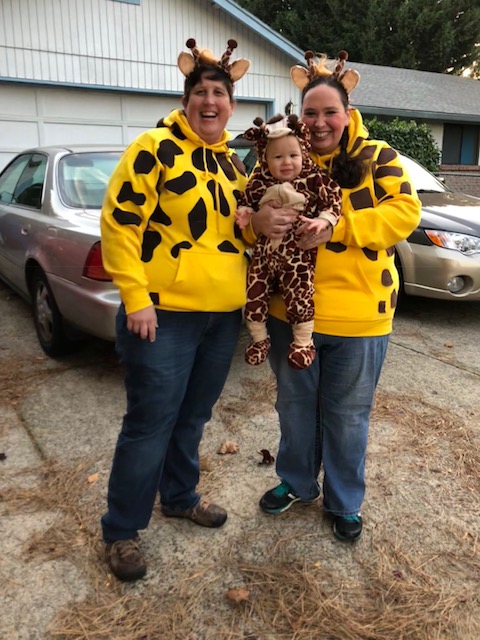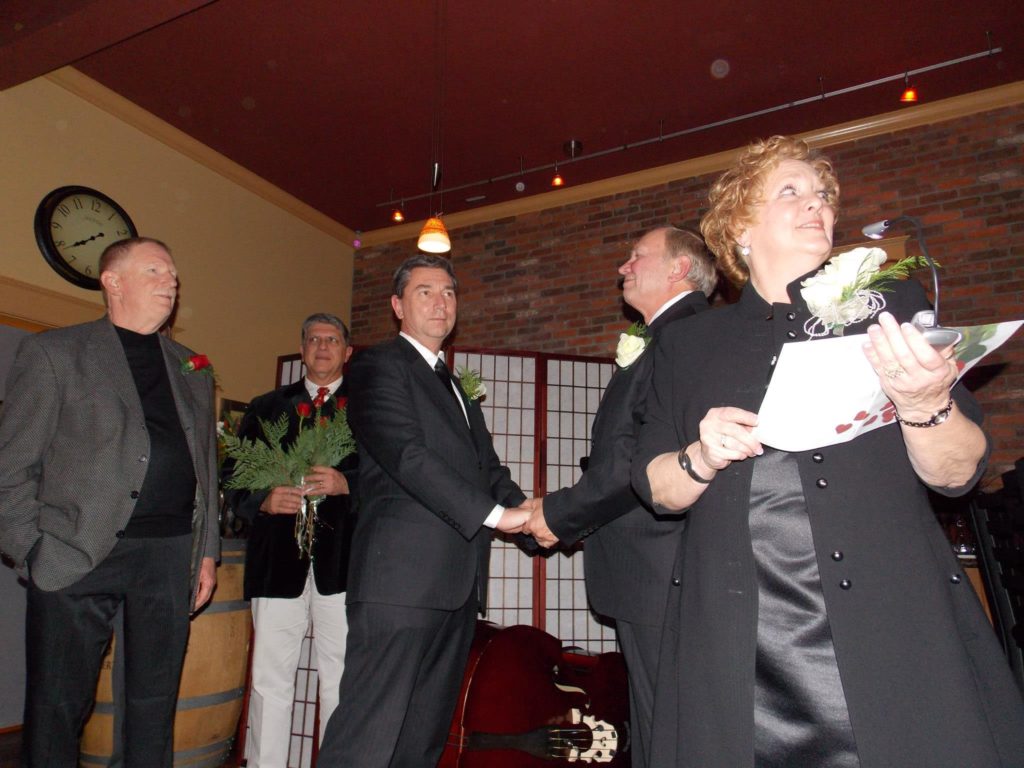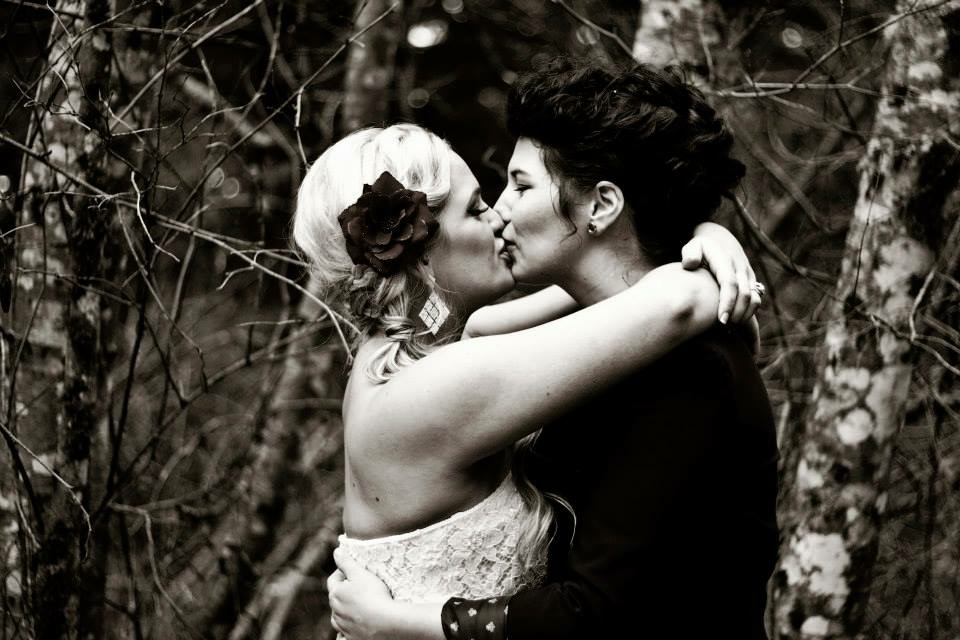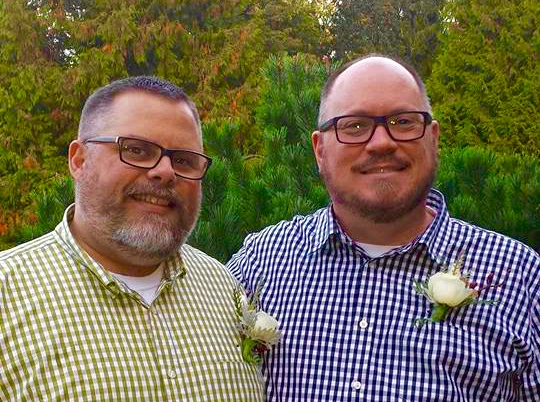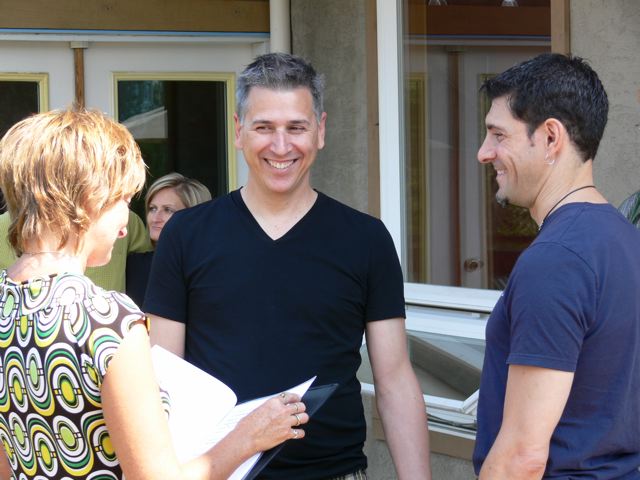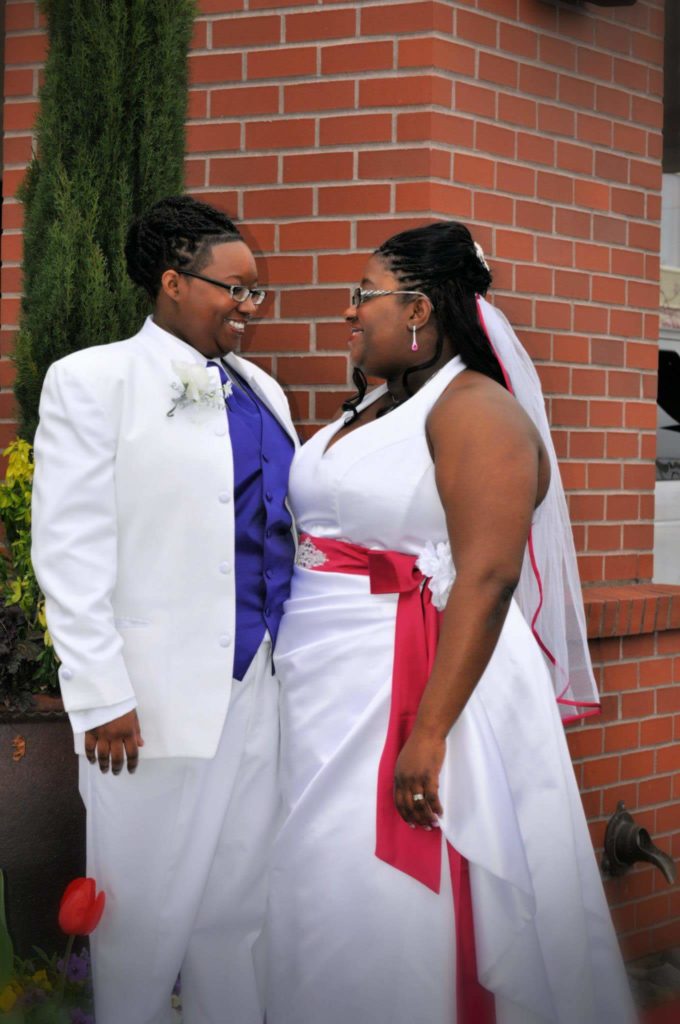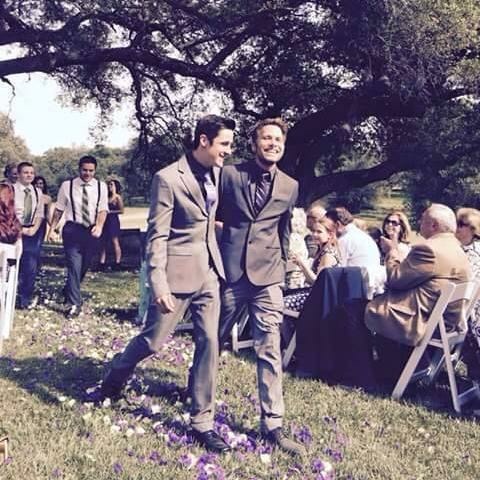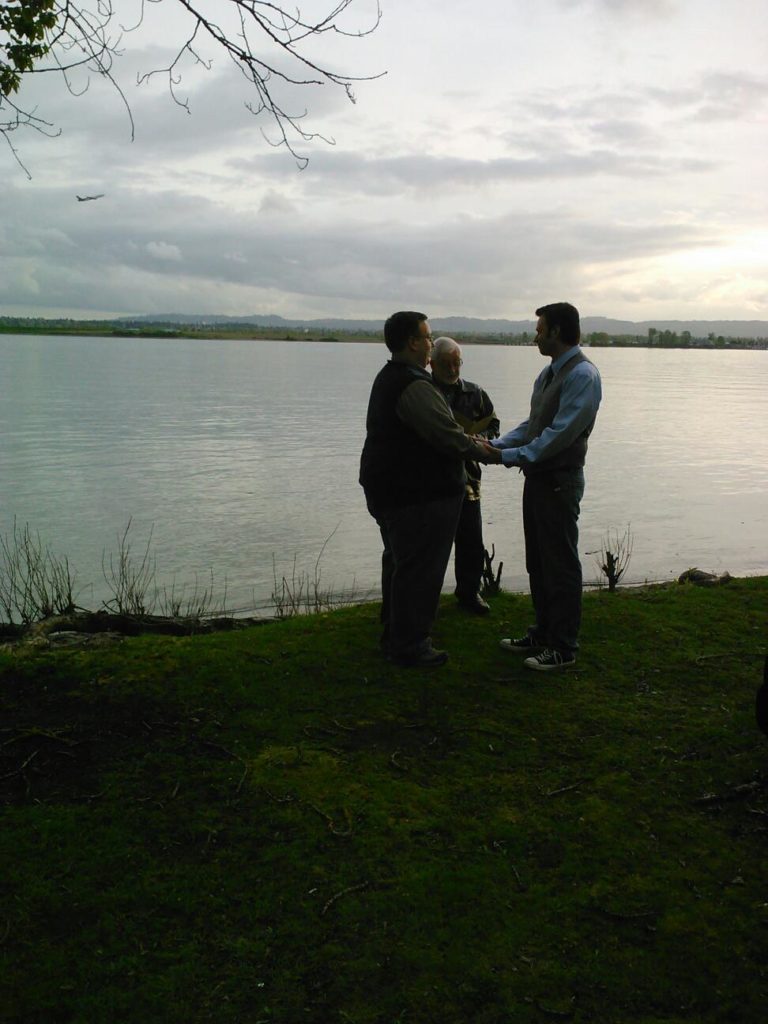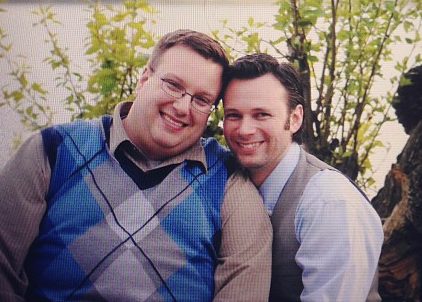A guy wearing horn-rimmed glasses threw open the ambulance door:
“Come with me if you want to live.”
Erica Erland, 38, laughs now about her encounter with the paramedic at Mount Desert Island Hospital in Bar Harbor, Maine. “He was like, ‘No, seriously.’ ”
The medical emergency that derailed her honeymoon with Mel Buckner was an upsetting and unexpected start to the women’s marriage. Two weeks after their Sept. 1, 2013 wedding in Vancouver, they flew to New York City and boarded a cruise ship for a Colors of Canada and New England tour.
“We were a solid 40 years younger than everyone else,” Erland said.
Enlarge

(Alisha Jucevic/The Columbian)
Buckner, 47, has a blood disorder. She was taking the blood thinner Coumadin, which worked for her but was considered volatile. Right before the honeymoon her doctors put her on a different medication.
“I’m allergic to it, turns out,” Buckner said.
After the ship left New York, Buckner was feeling ill and her face became swollen, which they initially chalked up to a cold or stress. Eventually, she had trouble breathing and developed chest pain and a fever. Because they were married Erland was able to arrange an emergency evacuation off the cruise ship in Bar Harbor. She was able to sign all of the necessary transport consent forms for her incapacitated wife. And, because they were married,
Erland could stay in the hospital room and even began palliative care. At one point they weren’t sure Buckner would survive.
Married only a few days before they realized the critical benefits of being married, the couple were also lucky to land in a state that recognized Erland’s right to make medical decisions on behalf of her new wife. (Maine’s same-sex marriage legalization went into effect a few weeks after Washington’s.) At the time, the U.S. Supreme Court was two years away from declaring same-sex marriage was a nationwide right.

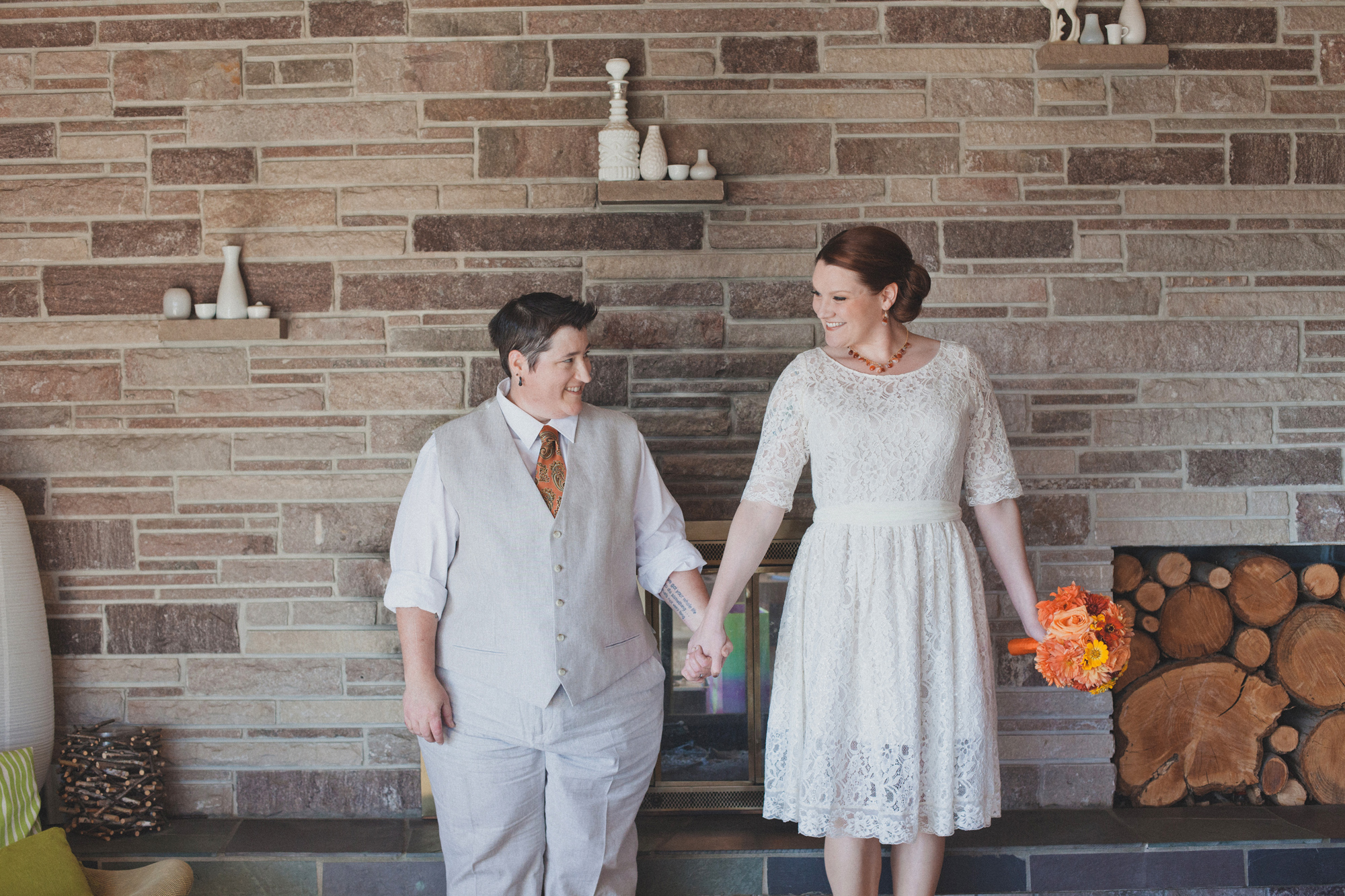
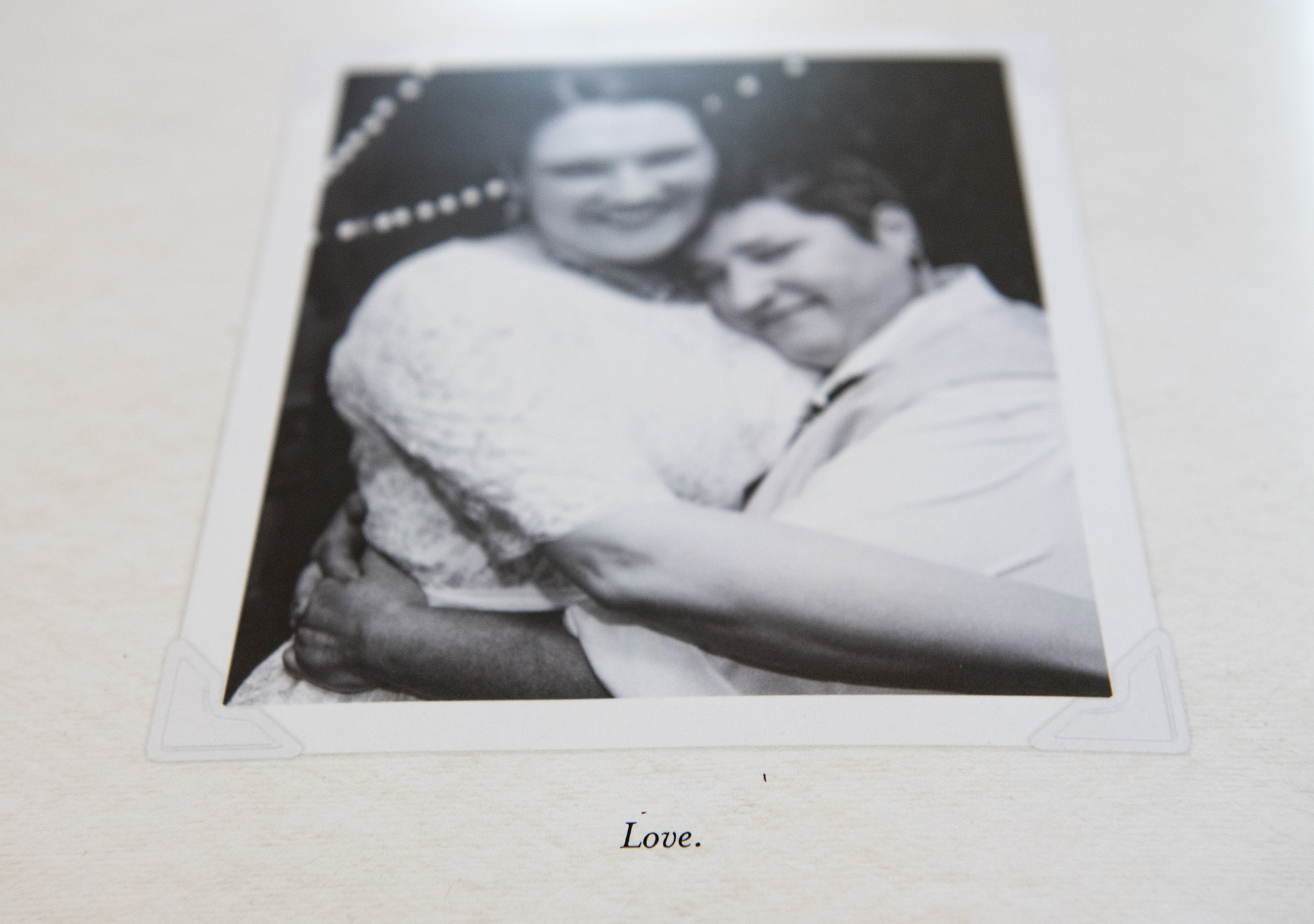
The older they get, the more the legal protections of marriage could come into play. There are 1,138 federal rights, benefits and privileges tied to marital status, including health care.
Reflecting back on her scary experience, Erland realized as she sorted everything out, being able to say “my wife is in the hospital in Maine” and that they ended up there “on our honeymoon” was important. People were sympathetic and helpful.
Still, there are efforts to roll back some of those medical-related benefits. Dec. 4, the U.S. Supreme Court declined to hear an appeal of a Texas court’s ruling that said marriage doesn’t automatically entitle same-sex couples to insurance benefits. Some see it as a way to limit the effects of same-sex marriage.
It’s those kind of recent headlines that put the normally bubbly and humorous Erland into a funk.
“All of that’s just disheartening and really hard,” she said. The rights she’s gained and the life she lives with her wife, “it all feels very fragile.”
Enlarge

(Alisha Jucevic/The Columbian)
Working for marriage
Before legalization, the pair canvassed for Referendum 74. As communications manager at Clark Public Utilities, Erland’s job is to talk to people, but asking people for their vote so she could marry the love of her life was oddly nerve-wracking.
“We knocked on doors in this neighborhood where we now live, so we could get married … which is not what everyone has to do,” she said.
They met on a website called OkCupid, which Erland, a matchmaker of sorts, recommends to all of her single gay friends. (She sends her straight friends to Match.com.) Their first date was at Cactus YaYa in east Vancouver.
“Within a couple of weeks we just fit. We just knew,” Buckner said.
There were no gay bars in Coeur d’Alene, Idaho, where Erland was attending a work conference and where Buckner planned to propose. But, Buckner found a gay night at one bar and popped the question by singing Bruno Mars’ “Marry You.”
“It’s a beautiful night, we’re looking for something dumb to do.
“Hey baby, I think I wanna marry you.”
“It’s the perfect engagement song,” Buckner said.
Being engaged and being able to call each other “my fiancée” and eventually “my wife” helped their kids “make sense of their world,” Erland said. She was previously married to a man and they still co-parent Oscar, 9, and Miles, 11. The boys switch off weeks at dad’s house in Camas and mom’s in west Vancouver.
Enlarge

(Alisha Jucevic/The Columbian)
“We still have lives that continue to intersect,” she said.
Before her sons walked her down the aisle, Erland’s ex-husband sent her off with a big hug.
Finding acceptance
Buckner and Erland each grew up in religious households where homosexuality was considered a sin.
“Growing up Mormon, I always felt different and I didn’t know why,” Buckner said. Looking back, she thinks “Duh, of course, I was gay,” and after she came out, some friends said they already knew. But she lost a lot of other friends.
After attending Brigham Young University Idaho — which back then was a two-year school called Ricks College — she went on a mission in Boston and then attended Utah State University, where she befriended “a super-funny, flaming queer.”
“He was helpful in my transition,” Buckner said.
It took years for Buckner’s mother to process the information. While the church considers homosexuality a sin, a tenet of Mormonism is family. So, family is forever, but what happens if a family member is gay?
“It’s a thing we don’t discuss, but she loves my wife. She loves my kids,” Buckner said.
At her wedding, since her dad had died of cancer, her mom walked her down the aisle.
Although Buckner no longer considers herself Mormon — she’s Buddhist now — she sees the value of church and the community people build through church. Not everyone has “the village” they have. That’s what they call their winding network of friends, family and might-as-well-be-family.
Enlarge

(Alisha Jucevic/The Columbian)
They all pitched in when Buckner was hospitalized in Maine.
Erland doesn’t consider herself religious, though she’s part of the Lutheran church choir down the street.
She moved a lot as a kid and attended different evangelical Christian churches. “Love the sinner, hate the sin” was an oft-recited phrase during her childhood.
“I said that. I knew I was gay from the time I was in preschool probably,” Erland said.
Erland remembers mustering up the courage to confront her dad in their backyard about how his political party was making her life harder and how things weren’t what they used to be and how she didn’t want to see him on the wrong side of history, embarrassed.
“Then, I finished my beer and threw it over my shoulder into the grass super-dramatically,” Erland said. “When I said that to him he changed his mind.”
These days, her dad is on a committee at work that looks to recruit and better serve LGBT employees. And, her mom was aggressive in making her Presbyterian congregation more welcoming in terms of ordaining gay clergy and marrying gay people. Churches across the country are making changes to be more inclusive and tolerant.
“My parents have become really strong advocates,” Erland said. “They are to me a testament that people can change, and so is Mel’s mom.”
Enlarge

(Alisha Jucevic/The Columbian)
Life’s routines
On date nights, Erland and Buckner frequent the Ilani Casino Resort and Sweet Tomatoes (which they once tricked their kids into believing was called Salad Palace). They play board games with their kids like “Settlers of Catan” and “Dominion.” One summer they let the kids build a makeshift town in the backyard and then had a professional photographer document the results.
Enlarge

(Alisha Jucevic/The Columbian)
When the boys are at their dad’s house you might find the couple on a given evening sitting around the kitchen table with friends drinking Coors Light, aka beer water, and putting together puzzles, aka playing “Do we have all the pieces?,” while Buckner cooks something savory.
There’s laughter — so much laughter in their cozy west Vancouver home.
“It gets better. I can actually, literally say that,” Erland said. “Life is good.”
Patty Hastings: 360-735-4513; twitter.com/pattyhastings; patty.hastings@columbian.com.
Gay mom’s book fields questions
When Julia Morrison and her husband divorced, and she came out to family and friends, Morrison made a trip to the library. She got books for her 6-year-old daughter, Eliza, to read about different kinds of families.
There were books about kids who have two moms or two dads, but none that really reflected their situation. Eliza has a mom and a dad. Her mom is gay. Her dad is not.
“Basically, I just wasn’t able to find anything that reflected our particular family,” said Morrison, a Vancouver schoolteacher.
When she met her now-fiancée, Beck Ivie, she joked about writing a children’s book. With Ivie’s encouragement, Morrison self-published “Love is What Makes Us a Family.” It’s told from Eliza’s perspective as she talks with her mom and dad.
Some of the questions posed in the book are ones real-life Eliza asked, such as, “Why does Mom kiss girls?” So, the book follows Eliza’s parents navigating and answering those questions.
The book was published in June 2016 and can be found in the Fort Vancouver Regional Library District along with the Multnomah County (Ore.) Library, as well as on amazon.com. It’s illustrated by Laura Knauer, one of Morrison’s closest friends.
Morrison said she’s interested in writing other books, possibly about parents or children who are transgender.
— Patty Hastings
